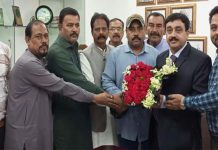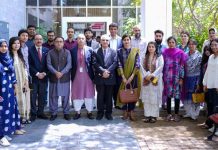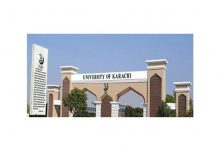*The social sciences play an important role in identifying societal issues
and proposing their solutions, Dr. Ajmal Khan*
The research in social sciences must be goal oriented and aimed to serve
humanity by suggesting ways and means to address human’s social
problems, Hasan Askari Rizvi, the former interim Chief Minister, Punjab,
said while delivering a keynote address at the University of Karachi on
Wednesday.
The Faculty of Arts and Social Sciences, KU, organized two-day
international conference on “new trends in social sciences and humanities
in the contemporary world: with reference to world peace order”, at Arts
Auditorium, KU.
Hasan Askari, Professor Emeritus, Political Science, Punjab University,
Lahore, and an Independent Political Consultant, informed the audience on
day one of the conference that social sciences could evolve mechanisms
which would be helpful in coping the intolerance from the society which is
one of the major reasons of extremism and terrorism.
He said that social sciences represent human’s efforts of studying and
examine each others and mentioned that modern world technology have
penetrated into our system and also being used by developed countries to
preach whatever they like to do.
“The social sciences provide diversity of opinion while accessing education
as uttermost priority can help in society’s development. Europe is the best
example in this regard. The continent was once living in a dark age but
with advancement of knowledge and industrial and other revolutions, they
are now dominating the world.”
He informed the audience that research on human issues requires hard-work
and adoption of scientific methodology.
“The universities are engine of change and societies can be transformed if
varsities played their due role. If governments’ spend on betterment of the
education system, it is investment of a nation in future.”
Meanwhile, the Vice Chancellor, KU, Professor Dr. Muhammad Ajmal Khan,
informed the audience that knowledge is power and if one wants to be more
powerful, he/she should get more education. “A person must have ability to
think out of box. Analytic approach while doing a task will excel your
performances.”
He observed that if a person cannot relate the research to the society then
it is useless as it would not help the humans. The KU VC told the students
that methodology and impact factors are essential for good research and
stated that taking a side and position are two different things and being a
researcher a person must know the difference between them.
He advised the students to talk to scholars present in the conference and
others whenever possible as these little discussions would give you new and
innovative ideas and approach.
The KU VC Dr Khan said that current age is of social sciences and the role
of social scientists is pivotal for national
growth. The social sciences play an important role in identifying societal
issues and proposing their solutions.
“It gives significant policy advisories to the policy makers and indeed
this conference outcomes will be benefit the policy making process of the
country. Nobody can deny the significance of social sciences in current era
but unfortunately it was not given its due importance in the past. During
last few decades a lot of significant and conclusive work is being done on
this field which is commendable.”
He observed that the world peace order is one of the most critical aspects
of international governance and scholars from different discipline of
social sciences can decipher ideas and theories which may be important for
the solution of problems relating to conflict and turmoil in the world.
Despite the best attempts of researchers and policymakers around the globe,
world peace continues to be hard to achieve. With more conflict-displaced
refugees in the world than ever before, it seems as though world peace may
be a more distant dream than ever before, Daniel Olson from Brier Crest
College, Canada, expressed while presenting his research paper on
understanding the need for identity in conflict and peace.
He mentioned that international bodies seek to enforce justice and mediate
solutions in conflicts. The policymakers formulate laws to address
structures of injustice in society and the peacemakers educate people,
seeking to influence their skills, values, and knowledge to better deal
with conflicts as they rise.
He observed that the perceived identity of individuals and societies can
often act as a catalyst for conflict, and in order for lasting peace to be
achieved, it is sometimes necessary for individuals and societies to come
to a different understanding of their own identity and relationship to the
world.
Meanwhile, Dr Najimdeen Bakare of NUST University Islamabad, shares his
papers on contradictions and rejection of globalization: implications for
global order. He mentioned that globalization is a phenomenal process;
potential enough to produce multidimensional outcomes.
According to him, while contemporary globalization is considered as the
harbinger of economic prosperity geared at flattening the world, it is
undeniable that same phenomenon has produced multiple outcomes.
“The whole process has generated an alignment of domestic and global
identity, responsible for the domestication of global identity and values.
While globalization tends to flatten the un-flattened world, it nonetheless
raises many questions, rejuvenates and enliven old (social constructed)
narratives and grievances and has caused an intersection of domestic and
regional actors either as supporters or opponents of global order and
system.”
The Dean Faculty of Arts and Social Sciences KU Professor Dr Muhammad Ahmed
Qadri delivered his papers on geo strategic importance of Karachi and
Gwadar cities: with reference to the China Pakistan economic corridor
(CPEC).
He informed the audience that a few years ago the name Gwadar was
unfamiliar to the world except to a few scholars who were familiar with it
due to its historical importance, as well as the deep sea of Arabia.
“CPEC has become a common tie between Pakistan and China as both countries
want to see this project successfully completed in time. Therefore, it
seems necessary to introduce Karachi and Gwadar to clarify the topic of the
research.”
Earlier, while giving his welcome speech, Dr Qadri expressed that
development of peace and harmony remains an important task not only for
heads of state but also for the international scholarly community. Scholars
and experts from the disciplines of arts, humanities and social sciences
have a much more important role to play in the promotion of peace than any
other discipline.






















